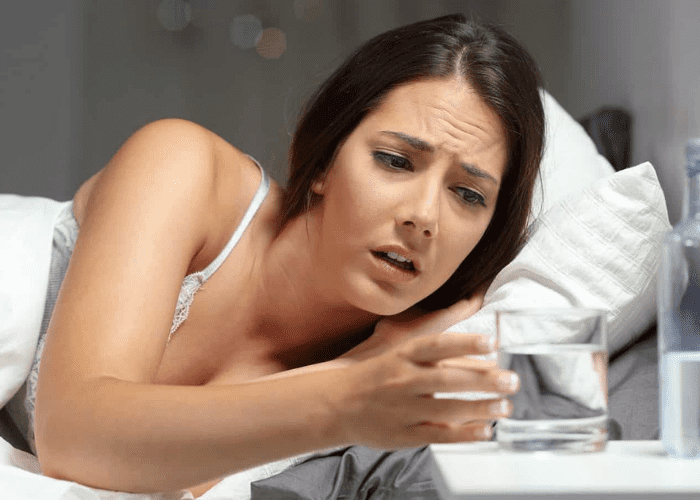Do you often wake up feeling parched and dehydrated? If so, you’re not alone. Many people experience morning dehydration, but few understand the causes. In this blog post, we will discuss the most common reasons why people wake up dehydrated. We will also provide tips for preventing and treating morning dehydration.
If you often wake up feeling dehydrated, it could be due to one of the following causes:
- You are not drinking enough water during the day.
- Not drinking enough fluids with electrolytes.
- Sweating excessively during the night.
- Medical condition that causes.
- Drinking too much alcohol
Why You’re Waking up Thirsty

You may wake up thirsty for several reasons, but almost all are related to one cause: dehydration. This article will explain how dehydration during the night, improper hydration from the day before, and other factors can cause you to feel parched in the morning.
Dehydration
The most common cause of morning dehydration. In the morning, your body will be dehydrated if you don’t drink enough fluids during the day. To prevent this, make sure to drink eight glasses of water or other fluids each day.
You likely woke up thirsty because you didn’t get enough water the night before. A person who is dehydrated either needs more fluids or has an electrolyte imbalance. You need a precise amount of electrolytes and fluids to perform important functions when properly hydrated.
Sweating, being ill with vomiting or diarrhea, and taking certain medications – like antidepressants – can lead to dehydration. Mild dehydration can cause headaches, dry skin, extreme thirst, and low blood pressure. If you work in the hot sun, train for a fitness event, or simply interact with people who may be sick, you’re more likely to dehydrate.
When you wake up, you often feel thirsty. Your body sends signals to encourage you to rehydrate when dehydrated, usually by producing the antidiuretic hormone (ADH) vasopressin. ADH triggers your thirst mechanism and tells your kidneys to store water rather than produce urine.
Fluid and Electrolyte Loss During Sleep
Your body naturally loses fluids and electrolytes while you sleep. If you snore or breathe through your mouth at night, moisture gradually evaporates from your nose and mouth, resulting in mild dehydration and thirst the next morning. CPAP machines and medications that treat sleep disorders like obstructive sleep apnea dry out mucous membranes and cause dehydration, particularly common in people with sleep disorders like obstructive sleep apnea.
Those with sleeping disorders may wake up thirsty in more ways than one since poor sleep can lead to dehydration. A hormone called vasopressin is inhibited by poor sleep. Water management and fluid balance in your cells are controlled by this hormone. In the absence of the right amounts, your body may not be able to balance fluids and electrolytes, resulting in dehydration and making you thirsty in the morning.
Your sleeping environment can also exacerbate dehydration. Your body produces sweat to cool itself. If you sleep in a hot room, you might experience night sweats and morning dehydration – any temperature over 67 degrees Fahrenheit counts.
Electrolytes and fluid are pushed to the surface of the skin by sweat. It’s absorbed into the air, which cools it. Since you’re sleeping, you aren’t replacing this fluid and electrolytes, resulting in dehydration that may cause you to wake up thirsty.
Dry or Humid Air
Mountainous climates, deserts, and winter can cause your nasal passages and mouth to dry out. Sleeping in a room with dry air can also cause you to wake up thirsty. You may also experience sleep disturbances and decreased performance the next day.
Too much humidity can also make you thirsty in the morning. Sweat cannot evaporate as quickly into the air in high humidity since it is already saturated with moisture. Because your body is still producing sweat, you lose electrolytes and fluids to stay hydrated. This results in no cooling. However, you cannot cool yourself due to dehydration and excessive sweating.
Medical Conditions
Diabetics have difficulty processing sugar. Diabetes mellitus and diabetes insipidus can cause excessive thirst in some patients. Due to this, their kidneys work harder to restore natural blood sugar levels by increasing urination.
The urine loss is accompanied by feelings of extreme thirst caused by an imbalance in vasopressin production. Dehydration and waking up thirsty are also caused by kidney disease, cancer, and urinary tract infections.
Hangovers
If you drank the night before, a hangover might be part of why you woke up thirsty. Diuresis is caused by alcohol, a diuretic that increases urine production. You lose fluids more rapidly as a result. Drinking water without mixing electrolytes will lead to dehydration if you don’t hydrate properly. Drinking too much alcohol can also cause vomiting, which contributes to dehydration.
Consuming alcohol
Finally, one of the most common causes of morning dehydration is consuming alcohol. Alcohol is a diuretic, which means it increases urine production. This can lead to dehydration and electrolyte imbalances. To prevent this, drink plenty of fluids before and after drinking alcohol.
Now that you know some of the most common causes of morning dehydration. Let’s jump into some ways to prevent and the best way to hydrate yourself.
How to prevent dehydration
If you want to prevent morning dehydration, it is important to drink plenty of fluids during the day and especially before going to bed. You should also avoid diuretics such as coffee and alcohol.
If you are sweating excessively at night, you may need to see a doctor to rule out a medical condition. Finally, if you take medications that cause dehydration, talk to your doctor about possible alternatives.
How to treat dehydration
If you wake up feeling dehydrated, you can do a few things to treat it. First, drink plenty of fluids. Water is always a good choice, but you can also drink fluids with electrolytes, such as sports drinks or coconut water.
You can also eat foods high in water content, such as fruits and vegetables. Finally, if your dehydration is severe, you may need medical treatment.
Do electrolytes keep you awake at night
There is no direct relationship between electrolytes and sleep. Electrolytes are minerals that are found in your body and play a number of important roles, including helping to balance the fluids in your body, regulating your heart rhythm, and enabling your muscles to contract.
However, it is possible that imbalances in electrolytes could affect your sleep. For example, if you have low levels of potassium, you may experience muscle cramps, which could disrupt your sleep.
On the other hand, if you have too much sodium in your body, you may retain water, which could lead to feelings of bloating and discomfort that could interfere with your sleep.
Is it normal to wake up dehydrated
It is not uncommon to wake up dehydrated, especially if you have not had enough fluids during the day or if you have sweated excessively during the night.
Dehydration can cause symptoms such as thirst, dry mouth, dark urine, and fatigue. To help prevent dehydration, it is important to drink enough fluids throughout the day and to avoid diuretics such as alcohol and caffeine.
If you are waking up dehydrated regularly, it may be a good idea to increase your fluid intake or speak to a healthcare professional for further advice.
Do you have any tips for preventing or treating morning dehydration? Share them in the comments below!
If you found this blog post helpful, please share it with your friends!





